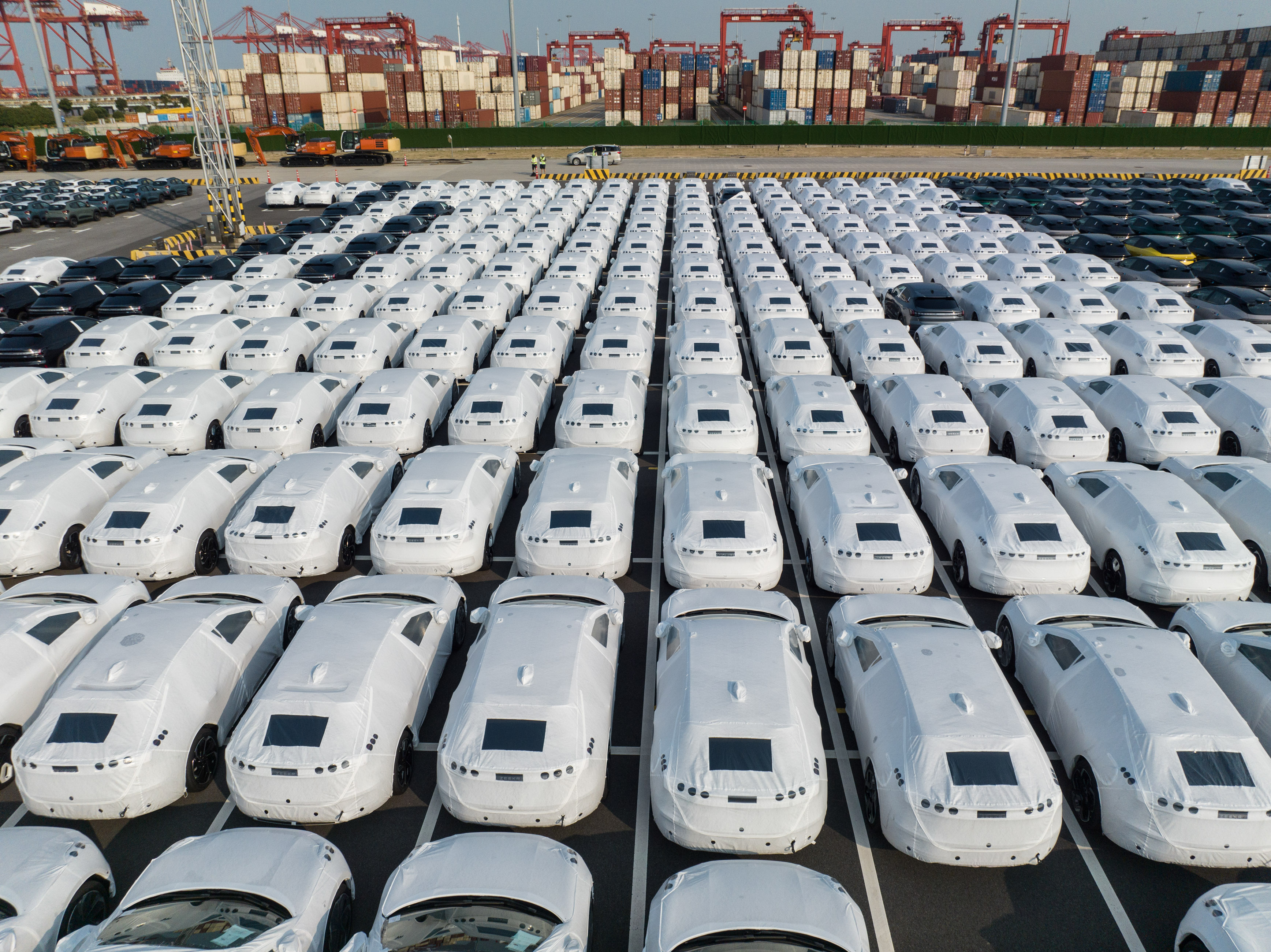EU to Slap Tariffs of Up to 48% on EV Imports From China
Listen to the full version

(Bloomberg) — The European Union will impose extra tariffs on electric cars shipped from China as of next month, taking levies to as much as 48% in a move that further escalates trade tensions and adds to the cost of buying an EV.
The bloc formally notified carmakers including BYD, Geely and MG-owner SAIC of the charges on battery-electric cars due to be implemented around July 4, the European Commission said, following an investigation of subsidies that started last year. China’s EV manufacturers have been pushing more aggressively into Europe amid a domestic price war and years of building a lead in the technology.

Download our app to receive breaking news alerts and read the news on the go.
Get our weekly free Must-Read newsletter.
- DIGEST HUB
- The EU will impose tariffs up to 48% on electric cars from China starting next month, affecting companies like BYD, Geely, and SAIC.
- China's Ministry of Commerce criticized the EU for ignoring WTO rules and warned of retaliation in sectors like agriculture and aviation.
- Import tariffs aim to protect the EU's car industry but could complicate EV affordability and escalate trade tensions; key EU automakers oppose these tariffs.
The European Union (EU) is set to impose additional tariffs on electric vehicles (EVs) imported from China starting next month, which could increase levies up to 48%. This move is aimed at addressing concerns about subsidies that Chinese manufacturers receive, and comes amid escalating trade tensions that will impact the cost of purchasing EVs in Europe [para. 1]. The EU's decision followed an investigation that began last year and officially informed automakers like BYD, Geely, and SAIC Motor Corp about these charges [para. 2].
The tariffs will vary based on the level of cooperation during the probe, with SAIC, the owner of the MG brand, facing the highest increase of 38.1%, in addition to the existing 10% duty [para. 3]. This comes despite objections from China, whose Ministry of Commerce has vowed to safeguard Chinese companies' legitimate rights, suggesting that the EU disregarded facts, WTO regulations, and objections from various EU member states and industries [para. 4].
Other Chinese automakers are also affected, with BYD facing an additional 17.4% in tariffs and Geely, which owns Volvo Car AB, facing an additional 20%. Western carmakers such as Tesla, BMW, and Renault, which manufacture in China, will also incur additional costs, with extra charges averaging 21% [para. 5]. Bill Russo, CEO of Automobility, remarked that the tariffs are a strategic move to slow down Chinese competition and encourage localization [para. 6].
One-fifth of battery-electric vehicles sold in the EU in 2023 were made in China, a figure projected to rise to 25% this year, according to Transport & Environment [para. 7]. China has threatened retaliatory measures across multiple sectors, including agriculture and the automotive industry, and has begun investigating certain European liquor types [para. 9].
The announcement led to a drop in stock prices of Chinese EV manufacturers, with Geely and Xpeng Inc. falling by over 5% and BYD by up to 3.9% [para. 10-11]. The EU's new tariffs are intended to protect the region's car industry and related jobs, amidst a green agenda focused on reducing CO2 emissions from transportation. However, market challenges such as Germany's removal of buying incentives for EVs complicate this objective [para. 12-13].
According to Moritz Schularick, President of Germany’s Kiel Institute for the World Economy, these tariffs may reduce imports from China by a quarter, valued at around $4 billion. Schularick emphasized the difficulty in balancing fair competition with promoting green technologies, noting that the tariffs would likely increase EV prices and make the climate transition more costly [para. 14].
The German Chancellor, Olaf Scholz, cautioned against restricting automotive trade with China, pointing out that German automakers, which sold millions of cars in China, would suffer greatly in a trade spat [para. 15-16]. Mercedes-Benz CEO Ola Källenius called for open markets, stressing that retaliatory measures from China could severely impact Western manufacturers [para. 17].
The EU has launched several trade probes against Beijing, especially targeting the clean-technology sector, including EVs [para. 19]. The final duty levels are expected to be confirmed by November [para. 20]. Amidst reduced sales projections for EVs in Europe, China's dominance in the global EV market has prompted protective measures from both Washington and Brussels [para. 22-23]. China has warned Brussels to reconsider the penalties, threatening tariffs on large-engine imported cars, and has been actively engaging with European officials to present their case [para. 25].
- BYD Co.
- BYD Co., a Chinese electric vehicle manufacturer, will face an additional 17.4% tariff on its electric cars exported to the European Union. Shares of BYD fell by as much as 3.9% following the EU's announcement. The tariffs come amidst escalating trade tensions and investigations into subsidies for Chinese EV makers.
- Geely
- Geely, which owns Volvo Car AB, will face an additional 20% tariff on electric vehicle imports to the European Union. Shares of Geely declined by more than 5% in Hong Kong following the EU’s announcement. The increased tariffs result from an investigation into Chinese subsidies and could impact the company's competitiveness in the EU market.
- SAIC Motor Corp.
- SAIC Motor Corp. is a Chinese state-owned company that owns the former British brand MG Motor. It faces the highest increase in tariffs imposed by the EU on electric cars from China, with an additional 38.1% on top of an existing 10% duty. Its popular models like the MG4 are prominent in Europe.
- Xpeng Inc.
- Shares of Chinese electric vehicle maker Xpeng Inc. declined by more than 5% following the EU's announcement of extra tariffs on electric cars shipped from China.
- Earlier this month:
- German Chancellor Olaf Scholz warned against restricting automotive trade with China.
- As of next month:
- The European Union will impose extra tariffs on electric cars shipped from China, taking levies to as much as 48%.
- Wednesday, June 12, 2024:
- BloombergNEF reduced its battery-electric sales projections by 6.7 million vehicles through 2026 in a new report.
- Wednesday, June 12, 2024:
- VW stated that the timing of the EU's decision on import tariffs is detrimental to the current demand of EVs.
- GALLERY
- PODCAST
- MOST POPULAR





 Sign in with Google
Sign in with Google
 Sign in with Facebook
Sign in with Facebook
 Sign in with 财新
Sign in with 财新